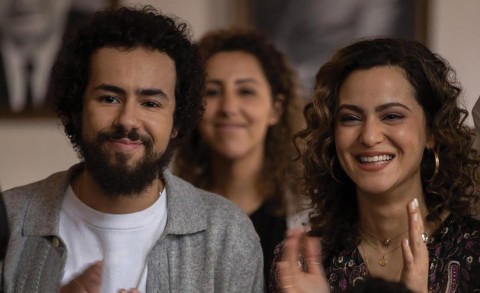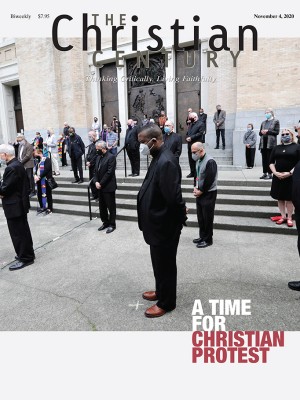Ramy Youssef is young, Muslim, and American
The comedian’s Hulu show has a rare trait: it takes religion seriously.

In the first episode of Ramy, the eponymous lead character is running late for Friday prayers at his mosque. He rushes through the mandatory ritual washing, splashing some water on his ratty white athletic socks instead of properly washing his feet. An older member of the mosque, Old Hajj, catches him and forces him to sit back down so he can wash Ramy’s feet. At the end of the episode, after Ramy has had two disastrous sexual encounters—one with a Muslim woman, one with a non-Muslim woman—he reencounters Old Hajj outside his kebab store. “You know why you’re so confused all the time?” Old Hajj asks. “You don’t wash between your toes.”
This encapsulates Ramy’s struggle through the two seasons of the show (available on Hulu): How seriously will he let his religious practice transform his life, and will it bring him the peace he seeks? Created by and starring comedian Ramy Youssef as the semiautobiographical Ramy Hassan, the show is both a very funny exploration of millennial culture (online dating, uncertain aspirations, receding hopes for a stable economic future) and a very serious exploration of what it means to be a religious person in that culture.
Read our latest issue or browse back issues.
Like many first-generation immigrant kids before him, Ramy and his sister, Dena (May Calamawy), move between two worlds: their majority-White New Jersey peers, with whom they share a love of all things pop culture and from whom they absorb an ethic of self-gratification, and their majority-Muslim community, with which they share expectations of piety and familial devotion. They are master code switchers, learning to hide the “un-American” aspects of their family life from their peers and the “non-Muslim” aspects of their peer life from their family.
Most of this tension—and most of the comedy—revolves around different attitudes toward sex. Ramy and Dena receive a strong abstinence-only education from their parents, and their community prizes intra-Muslim marriages arranged largely by networks of relatives and friends. Their father, Farouk (Amr Waked), compares losing one’s virginity before marriage to opening a can of Coke: one day later it is ruined. Abstinence-only attitudes toward sex (and metaphors of the irreparable damage premature sex causes) are common among White Christians, too—but if their White peers are getting the same sex talks at home, the Hassan kids are unaware. The dominant culture they share with their peers prizes sexual freedom above all else, and Ramy, at least, has a hard time disentangling his sexual desires from his core sense of self.
Ramy navigates these two cultures by inventing his own evolving and conflicting standards. He has sex before marriage but feels guilty about it. He only has sex with non-Muslim women but then realizes that this assumes Muslim women don’t have the same sexual feelings and freedom he prizes in himself. He double-checks all the condoms he uses to make sure they are effective, because he is pro-choice but also doesn’t want that choice to ever be invoked. Most of Ramy’s sexual encounters are hilariously fraught as he earnestly tries to thread the needle between modern hookup culture and his longing for purity.
To some degree Ramy joins other recent comedies like The Big Sick and Master of None, which follow first-generation Muslim American kids as they wrestle with their identity. In those comedies, sex is also the main way these characters demonstrate that they have embraced their Americanness, and humor shows they don’t take their families’ strange religious commitments too seriously.
But Ramy breaks from these other comedies, because Ramy does take his religious commitments seriously. God is real for Ramy, and he is earnestly—if confusedly—seeking to follow God’s path. He undertakes different regimens of spiritual commitment: more faithful mosque attendance, more rigorous Ramadan observance, Sufi mystical practice, private prayer, seeing a spiritual adviser. He spirals between being insufferably devout and preachy to his friends and family and abandoning his spiritual quest in favor of self-destructive behavior.
There is something of Augustine’s “make me good, just not yet” in Ramy’s quest for spiritual belonging. But by the end of season two we realize that sex isn’t a special sin or even a real barrier to God; it is just the particular way Ramy sabotages his own ability to commit—to a person, a spiritual path, or God. Ramy’s real struggle is against a “live in the moment, do what feels good” ethic that he can’t quite seem to abandon, no matter how much he is drawn to ego-denying spiritual practice.
Things don’t look great for Ramy’s spiritual quest at the end of season two. But it is a rare show where the central drama revolves around forgiveness and seeking God. Ramy uses humor not to mock these concerns but to make them accessible and compelling. I don’t know what it would look like for Ramy to find the peace he is seeking, but I will keep watching to find out.
A version of this article appears in the print edition under the title “Young, Muslim, and American.”







